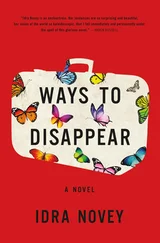But I have Bernard on my mind.
When he called Winnie back, during breakfast at the guesthouse, she told him that Lærke had disappeared. But we couldn’t just rush back home, because they still thought he was in Aalborg. Then a couple of hours later he got a call from Tivoli’s security office.
Although Bernard and his in-laws had explained to Lærke a hundred times that he was taking a business trip, she got it in her head that he was off having fun somewhere without her. And she thought that that somewhere must be Tivoli, the old amusement park in Copenhagen. She went down to the station in her wheelchair and took the train to the city. She managed to get into Tivoli, but once she was inside, the battery on her wheelchair died, and one of the security guards found her in her chair under some low-hanging branches on a path by the lake there.
Our vacation was never the same after that. Bernard spoke to her on the phone for an eternity, and when the two of us were alone again, I could feel he was elsewhere. Late that afternoon, I suggested that we go back home, and he didn’t object.
On the couch I can feel Frederik’s hand on my shoulder. He says, “Pretty soon Lars Brygmann will turn up, won’t he?”
“He might.”
“That scene where they chase him in the mall?”
“Yeah …”
If I turn my head, I’ll find myself looking straight into Frederik’s eyes. I don’t, but I can feel the weight of his gaze.
I need to leave him at some point, but how do I do it so that Niklas will suffer as little as possible? And how do I keep Frederik from committing suicide? And will I ever be able to take Lærke’s place in Bernard’s life? Then there’s the finances of a divorce. I’ve been trying to calculate my income and where I can afford to live. And to calculate what Frederik will have for rent from his disability pension each month.
“See, here comes the mall,” he says. “Is your coffee too cold?”
“No, it’s fine.”
“I can put it in the microwave and zap it for twenty seconds.”
“It’s just fine, Frederik. No need to bother.”
“Should I make a new pot? I could do that too.”
“Frederik, it’s okay. Why don’t we just watch the program?”
I’ve never seen so much TV as I have this summer, as I try to get some clarity about the best way to leave my husband. I’m nearly up to the national viewing average.
Once darkness falls on Farum, the multicolored light of the TV screen flickers in the window of every single home where a married couple over forty lives. I finally understand why: before all those screens, in solitary silence, men and women are taking out their questions and calculations, holding them close to their chests, rocking them back and forth — questions and calculations they mustn’t voice out loud. Should they leave their partners or not? How should they tackle a divorce, practically speaking? The finances and what people will say, the family, the kids?
In front of their screens they ponder the options, year after year.
Tonight I decide to wait till next summer. Niklas needs to be done with gymnasium, and Frederik needs to be more involved with his new friends, so I can feel sure he won’t kill himself. And now we have a court date. The trial will start in a month and a half, which means that a couple of months from now, Frederik will probably be behind bars. If I want to ever look myself in the mirror again, I’m going to have to support him until then, and through his initial time in prison too.
I’m the only person now who’s 100 percent certain that Frederik’s not the man I married. A few times he’s said — in jest, I suppose — that I act as if I have Capgras syndrome, a syndrome in which a person’s convinced that her closest friends and relations are no longer themselves but have been replaced by impostors.
When the crime show’s over, Frederik reaches for the remote and resolutely presses the power button, as if he’s been waiting for a long time to do so.
“I’d like to see the news,” I say.
He doesn’t answer. Instead, he takes our wineglasses from the table, handing me mine as he raises his own and gazes into my eyes.
“I’m a very lucky man,” he says, his voice calm and tender. “I’m married to a woman who made a tremendous effort on my behalf while I was sick. That’s something I’ll always remember. And as if that wasn’t enough, you’re just as beautiful and sexy as when I met you more than twenty years ago. I look around at other women and how they’ve changed, and believe me — I don’t take it for granted that you’ve gotten so much lovelier.”
“Is that really the best you can come up with?” I scoff. “How full of clichés can one man be?”
He smiles crookedly at me. “Cheers, darling.”
I feel compelled to raise my glass, but I can’t stand looking him in the eye and quickly focus on the rug again.
“I’ve been watching you when you go out on the balcony with the watering can, when you set your purse on the table like in the old days and let yourself fall back in the armchair — all the little things, the things that are you . I look at you, and though I don’t say anything, I have such a desire to touch you, to kiss you.”
I get up. It’s impossible for me to remain seated so close to him.
“Can you remember what I told you that time?” he continues. “How it’s impossible for us to live without each other — because we’re meant for each other?”
Right away I know the night he’s talking about. The dinner we had just after I was hospitalized.
I grab a cushion from the couch and swing it at him. “So you thought you’d mention the time I had my stomach pumped. Just something we ought to remember, eh? You think it’s a good thing to bring up? It won’t put me in a bad mood, not at all!”
The wine’s knocked out of his glass.
“All your powers of empathy, Frederik, could fit on the head of a pin!”
“I’m sorry! I’m sorry! I just wanted—”
“You want this and you want that! I’m so tired of being married to a sick man who can’t help any thing that he does!”
“But Mia, it was only because I was hoping that—”
“That’s enough! It’s simply beyond the pale! I can’t stand it!”
He doesn’t say another word, just gets up and goes to his room. He can’t even deal with it anymore; he’s gotten to be such a wuss.
I storm up and down the length of the room, waving the cushion in the air, and then I hurl it against the wall. It springs back and knocks his glass off the coffee table and shatters it. Shit!
What’s he doing in there? I go over to his room and throw open the door. “Now what? What?”
He’s sitting on the edge of the bed, doubled over, his head buried in his hands. “It’s true,” he mumbles. “And I understand. I do understand. How will you ever again be able to …? And Saxtorph, and Laust, Niklas and our house and—”
“Don’t start blubbering about suicide again!” I yell. “I won’t hear it! It’s not fair!”
I slam the door and go back to the living room, where I start pacing up and down again.
I go back to his room and fling open the door once more. “And how am I ever supposed to have any desire for you when you’re such a wimp?” I shout.
He hasn’t budged. He sits on the bed in the same curled-over position as before, hiding his face, not answering my question.
“The real Frederik wouldn’t act like this! You claim you’re healthy — then pull yourself together! Be a man , God damn it!”
I slam the door again and go back to the living room. I fling myself into the armchair, turn on the TV, watch it for maybe ten seconds, then turn it off.
Читать дальше



![Ally Carter - [Gallagher Girls 01] I'd Tell You I Love You But Then I'd Have to Kill You](/books/262179/ally-carter-gallagher-girls-01-i-d-tell-you-i-lo-thumb.webp)








